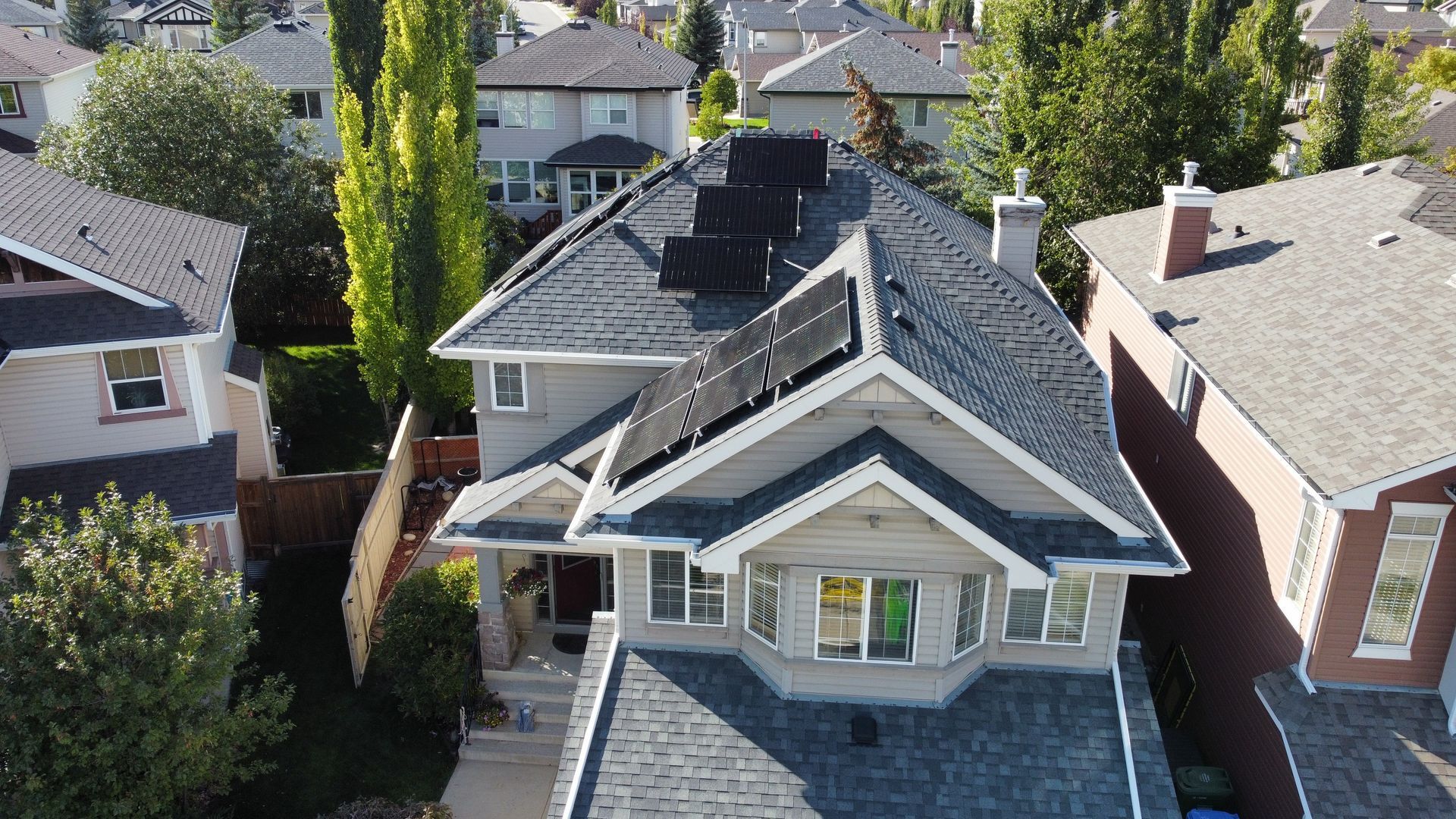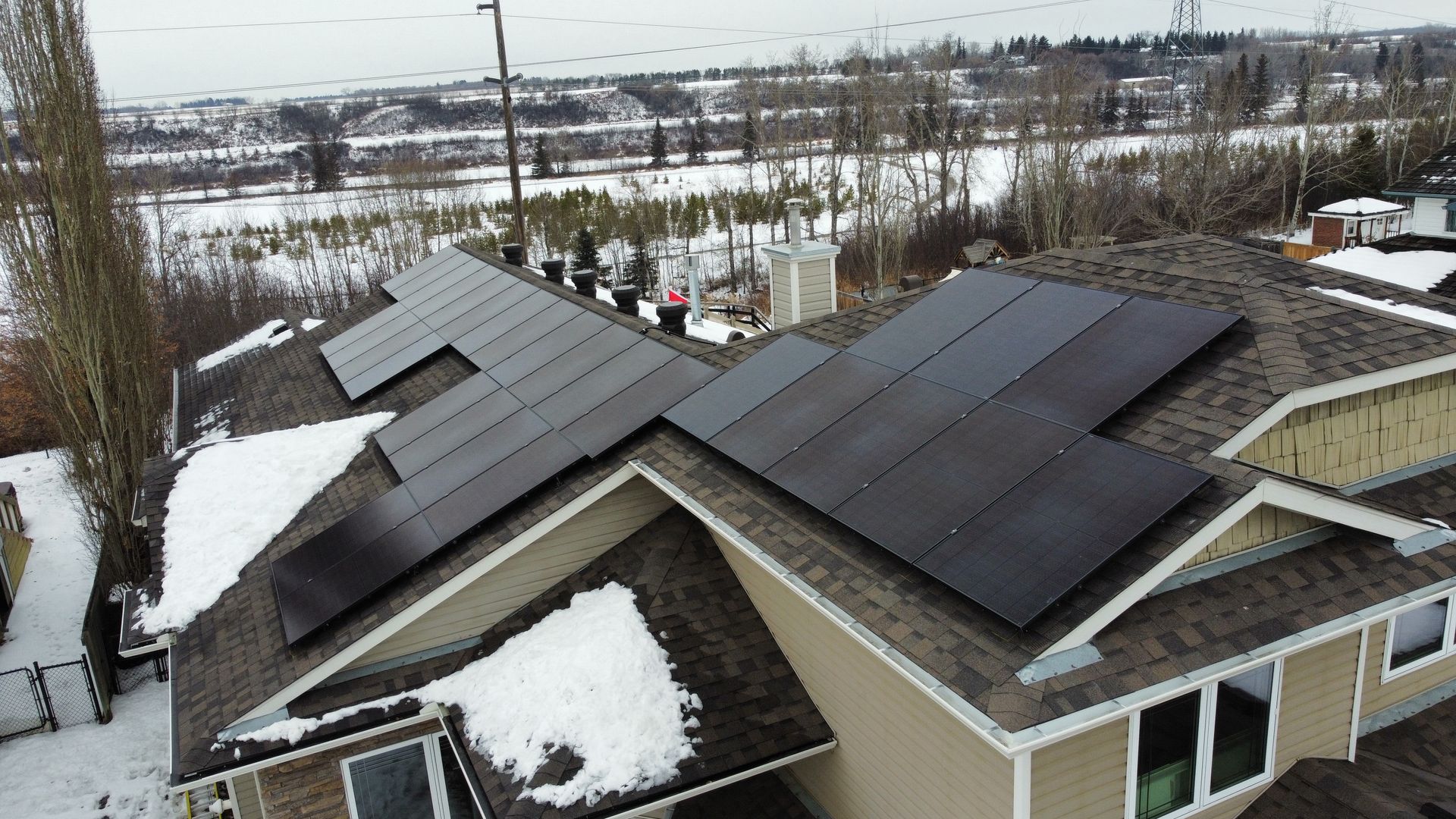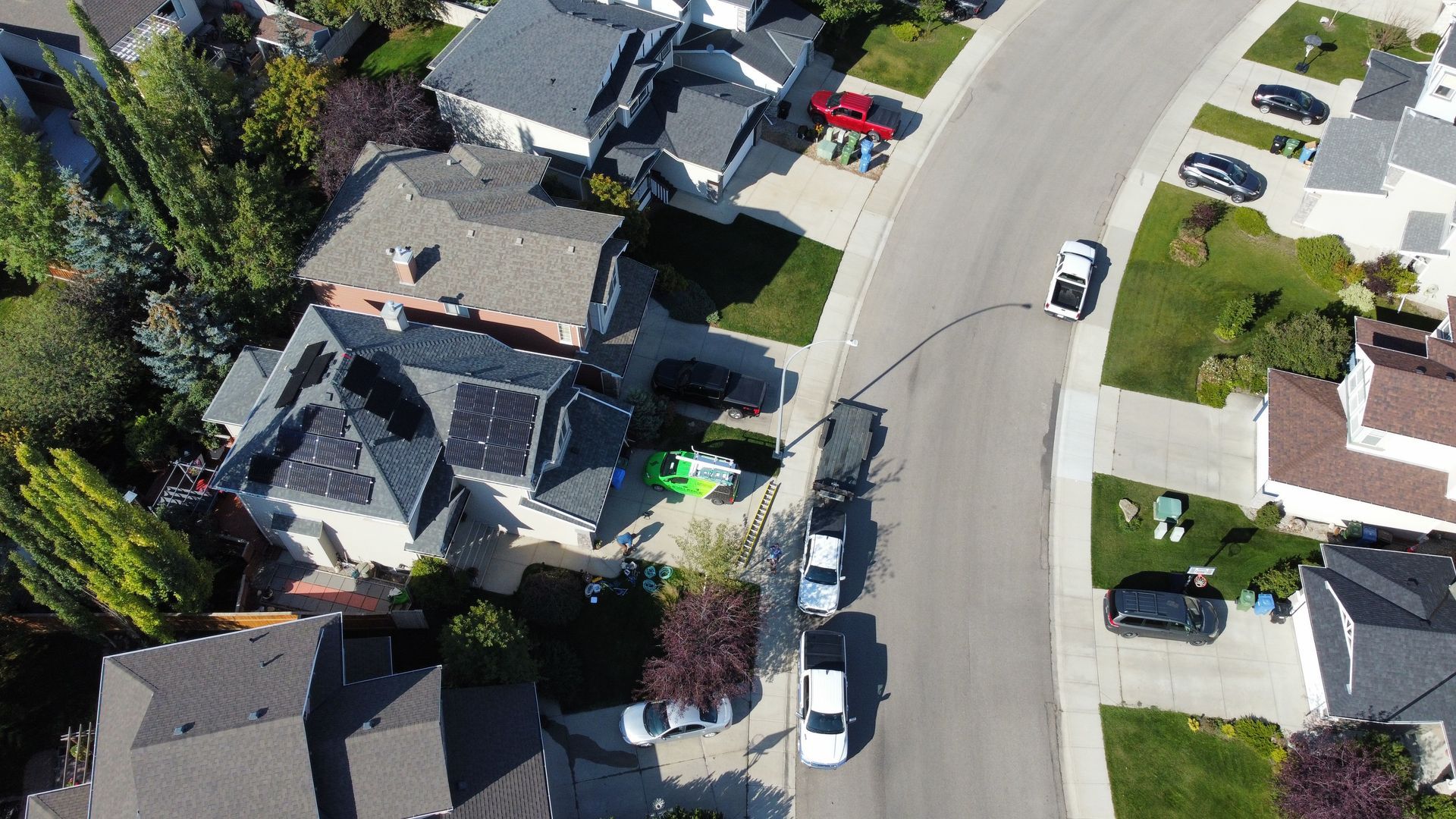How Much Does it Cost to Install Solar Panels in Alberta?
The average cost to install solar panels on a single family home in Alberta ranges from $15,000 - $30,000 before grant funding incentives. This price will depend on the amount of solar panels required, the layout, and any electrical upgrades necessary for installation.
Are you considering installing solar panels but need more information about the costs involved? Solar energy is a great way to reduce your carbon footprint and save on your electricity bills in the long run, but the initial investment can be daunting. This article will dive deeper into the costs of a solar installation, so you can determine a more accurate range for your home installation. Every home is different, and the simplest way to find out how much your installation could cost is to get a free residential solar quote from Evalence. Alternatively, visit our Edmonton Solar Page or Calgary Solar Page.
We will provide you with all the information you need to know about solar panel costs including sizing your system, the components required for a solar installation, potential electrical upgrades required for solar, and other hidden costs that impact solar quotes.
What is solar panel price per watt?
Solar panel price per watt, or $/Watt, is the installed price of a solar panel system divided by the wattage of the panels. This calculation is used to provide a basis for comparison between different solar projects. It allows projects of different scale to be compared easily, or for quotes to be compared between different solar installers.
The average $/Watt for roof mounted solar installed in Alberta ranges from $2.50-$3.50/Watt.
The Impact of Home Electrical Usage, Roof Design, Location, and Shading on Your Solar Quote
In Alberta, homeowners are permitted to install solar modules capable of producing up to 110% of their annual energy usage. This usage can be determined from the properties power bills, or via a third party authorization with the wire provider to assess the home interval data. The amount of electricity consumed by the homeowners will greatly impact the size of the solar system required to offset this usage. Therefore, homes using 500-600 kWh of electricity per month will require many less panels than a home which uses more than 1000 kWh of electricity per month. In addition to home electrical usage, roof design and shading of solar panels from surrounding homes, trees, and other obstructions will impact the solar potential, including the size of the system required & in-turn the price of the installation.
Electrical Usage & Solar System Sizing
A solar system is composed of a number of solar panels wired together to produce power from the sun. The average home requires 10-30 solar panels to offset home electricity usage. One of the primary factors influencing the number of solar panels required to reach 100% electricity offset is the amount of electricity the home consumes in a 12 month period. Homes that are large consumers of electricity will require more solar panels to offset their energy bill.
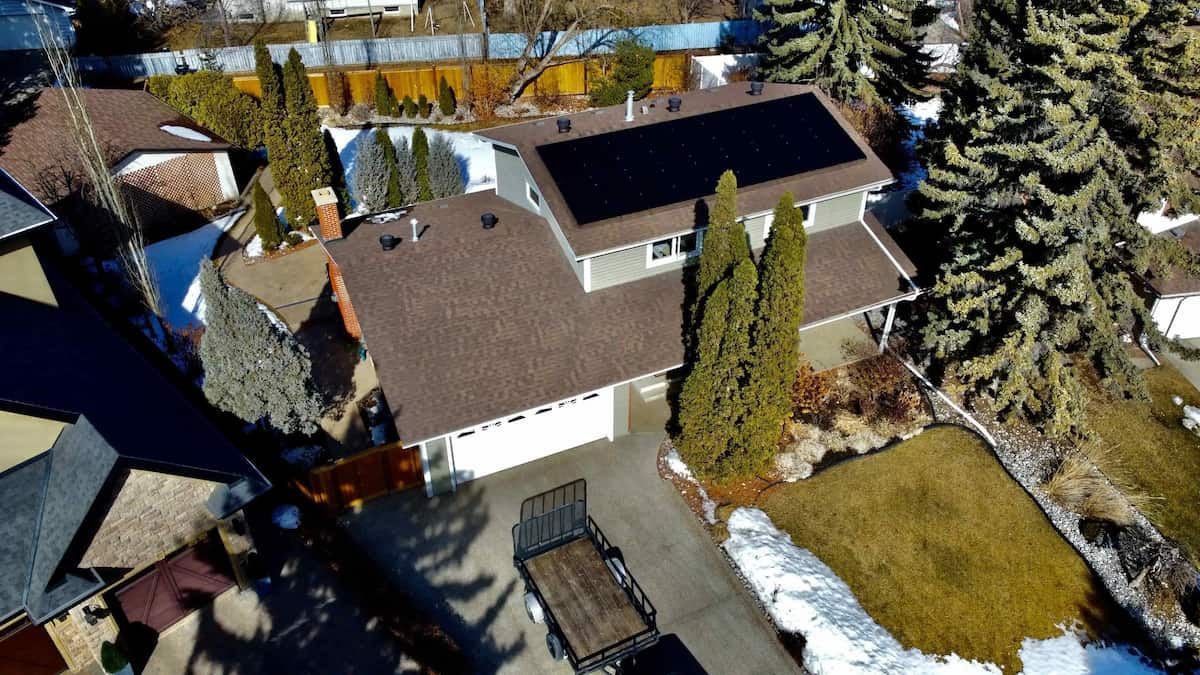
18 solar modules installed on a home in Edmonton, Alberta.
Roof Design & Solar System Sizing
Roof design - including the size, shape, pitch, and orientation of roof planes and vents will greatly impact the solar array design. Within the Northern Hemisphere, South facing roof slopes are the optimal plane for solar as they face more directly towards the sun which translates into higher solar production than North, East, and West facing roof slopes. Solar panels located on South facing roof slopes can produce more than twice the energy output as North facing panels!
Roofs with a variety of complex features like gables, skylights, and other unique features can complicate solar layouts leading to increased costs. For example, a conventional detached garage roof where 10 panels can be placed in a grid is often the simplest type of roof to install solar on resulting in a more affordable installation price. Another consideration which can impact the price of an installation is the amount and location of roof vents. These features can limit the available areas for solar panel installation, and can add costs to the installation if they are required to be relocated. The average cost to relocate a roof vent in Alberta is typically about $250-$350 for a simple vent, and can rise to $1,000 for plumbing vents.
How Does Location Impact Solar Production?
Cities known for their sunny days will typically be great locations to install solar panels. The City of Calgary receives an average of 333 days of sun each year, while the City of Edmonton receives an average of 325 days of sun each year (#1 and #2 in Canada Respectively). Comparatively, Vancouver only receives 289 days of sun, and these are often partially sunny days due to the pacific coast climate. Due to the long hours of sunlight in Alberta, a solar panel installed here will often produce more renewable energy than if it were installed outside the province!
Shading & Solar System Sizing
Shading is the impact of objects blocking solar panels from direct sunlight throughout the day. This most commonly occurs from neighbouring buildings, trees, or other roof planes between the path of the sun and the solar panel location. Panels impacted by shading will have "shading losses" and will produce less power throughout the day. This is normal, and accounted for during the design process to ensure the overall solar system is sized large enough for the electrical consumption. Properties heavily impacted by shading will generally require more solar panels to be installed to offset the home electrical usage.
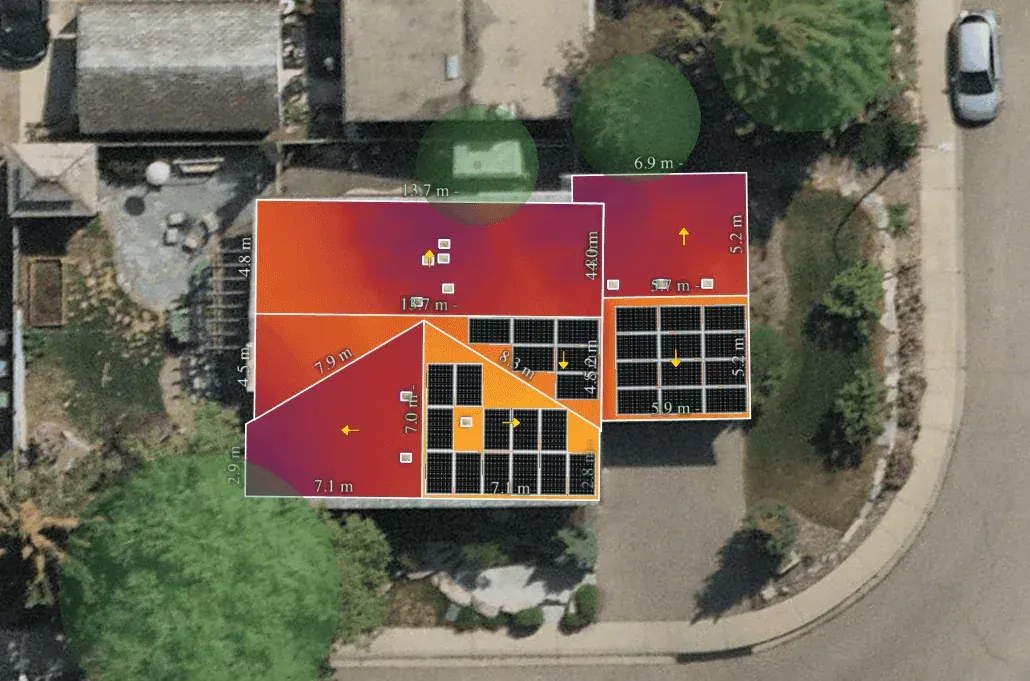
Solar shading analysis completed for a property in NW Calgary.
What are the Components of a Solar Installation?
Solar Panels
Solar panels are the most obvious component in a solar installation. Their are many brands to choose from, but the most commonly installed solar panels in Alberta are LONGi, Canadian Solar, JA Solar, and Thornova. The price of solar panels will range based on the size of the panel, performance warranty, brand, and distributor. Most solar panels come with a 10 year material defect warranty, and a 25-30 year performance guarantee. The panel brands mentioned above are designed for Canadian winters, and are often hail rated (An important consideration in Alberta).
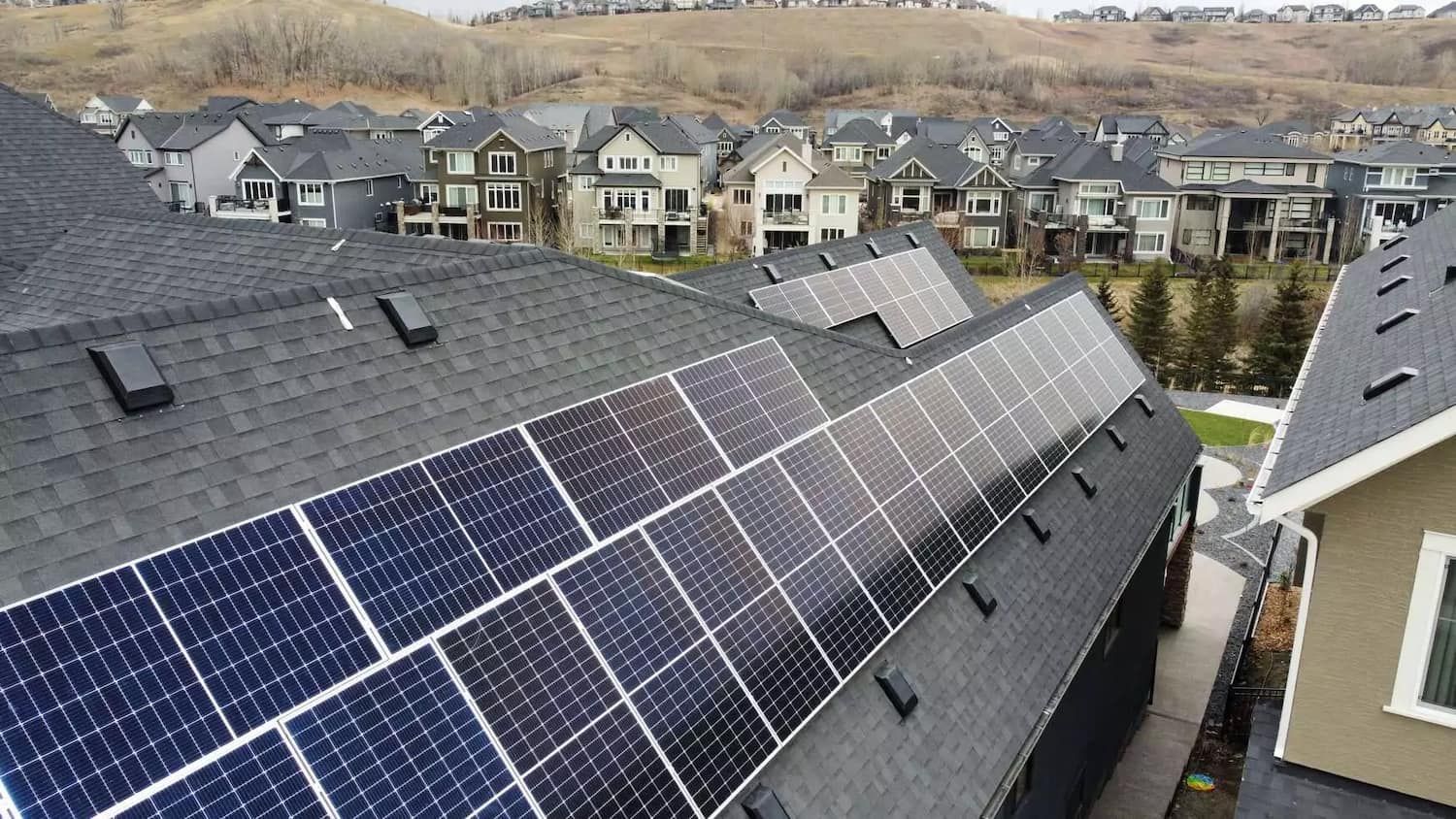
34 LONGi 505W Panels Installed in Calgary, AB.
Inverters or Microinverters
Inverters and microinverters convert DC power produced by solar panels, into AC power used in the household. Every solar installation requires either an inverter ( a single device usually located near the home electrical panel, or outside by the meter), or microinverters (typically 1 for every 2 solar panels). These devices come standard with a 10 year warranty, which can be extendible to 25 years. The most commonly used brands of microinverters in Alberta include APSystems, Enphase, and Hoymiles.
Mounting Hardware & Solar Racking
Mounting hardware and solar racking is necessary to safely secure solar panels to the roof or the ground. This component if often overlooked by homeowners because it's not typically seen during the solar installation, and does not usually impact the solar production of the system.
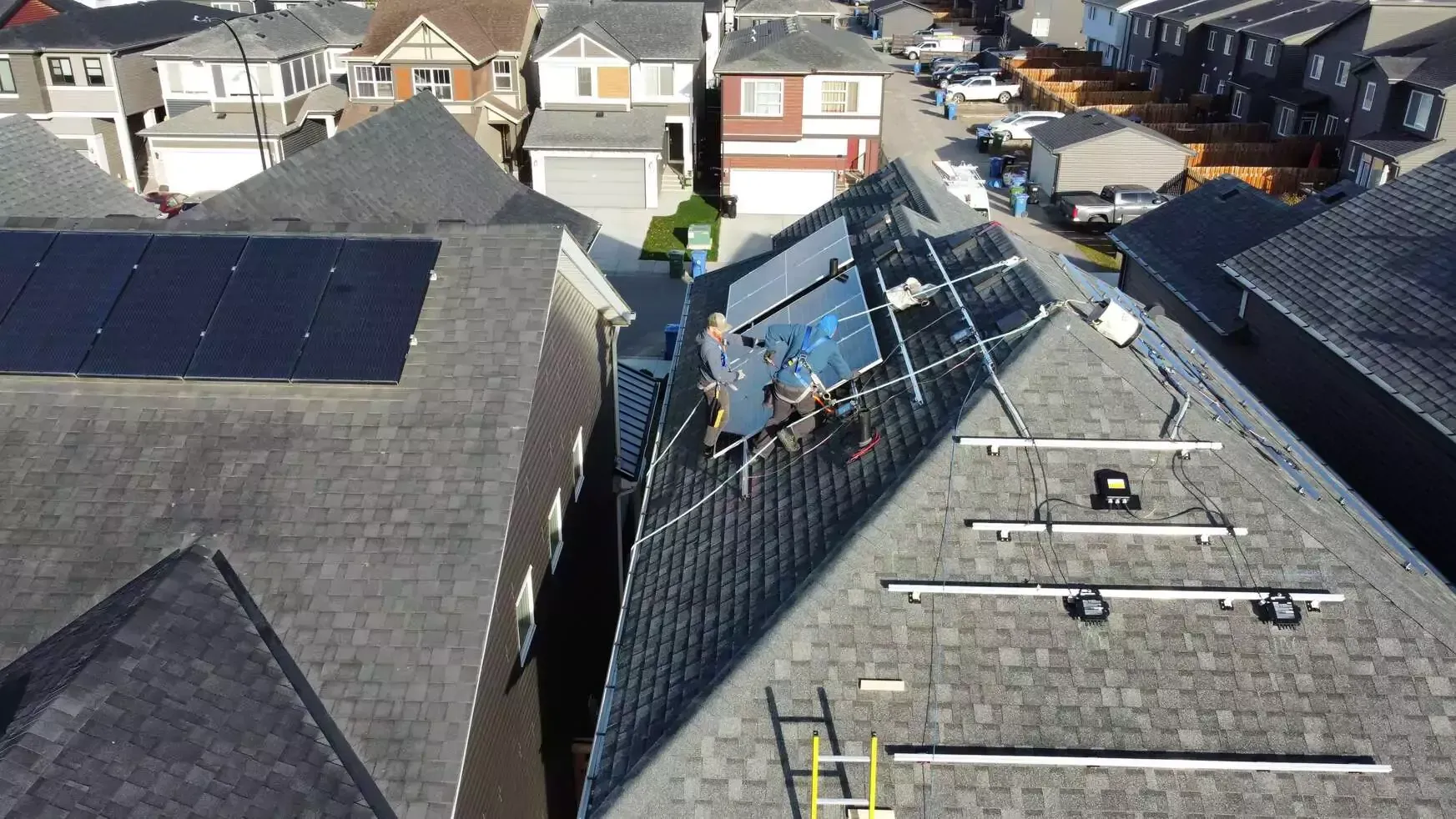
Solar panel installation in progress with exposed racking, microinverters, and wiring.
Electrical Wiring, Solar Breakers, Junction Boxes, and Other Components
Electrical supplies are required to connect the solar panels to the main electrical panel safely and in compliance with the Canadian Electrical Code. These supplies range significantly in cost based on the home layout and solar panel layout. Complex layouts with multiple solar arrays will often require more materials than simple layouts.
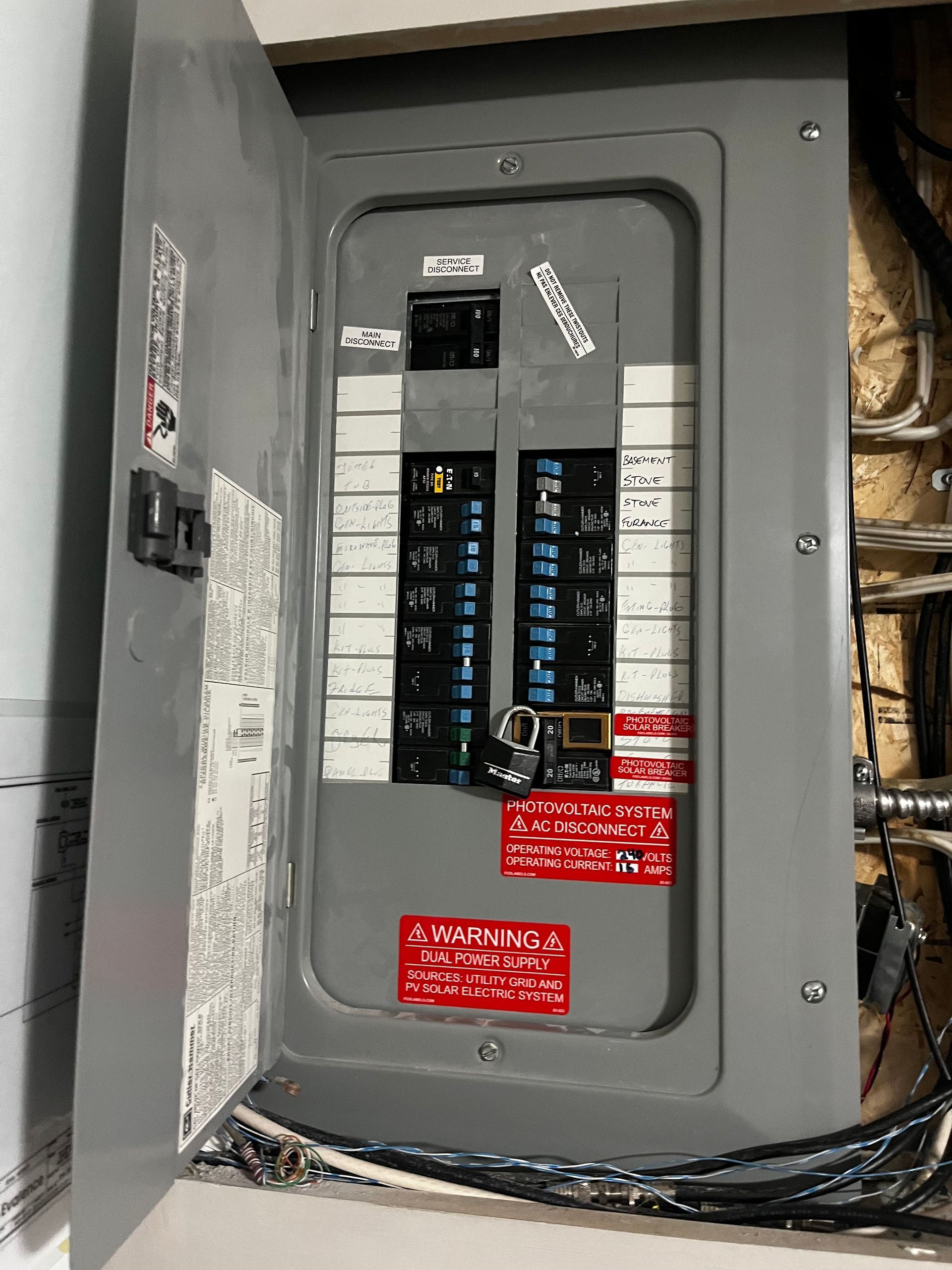
Home electrical panel with solar breaker installed, and solar labeling.
Permitting & Administrative Costs
Solar installations in Alberta must be permitted by the municipality, and the wire provider via the microgeneration application. Preparing the documents for these applications can require design, administrative work, and the payment of the municipal electrical permit ranging from $300-$500. If structural or electrical engineering is required this will also increase the cost of an installation.
Installation Labor
Installation labor is a crucial component when considering the cost of solar panels. The labor costs can vary depending on factors such as the size and complexity of the installation, the location of the panels, and any additional customization required. It is important to hire qualified professionals who have experience in solar installations to ensure a safe and efficient setup.
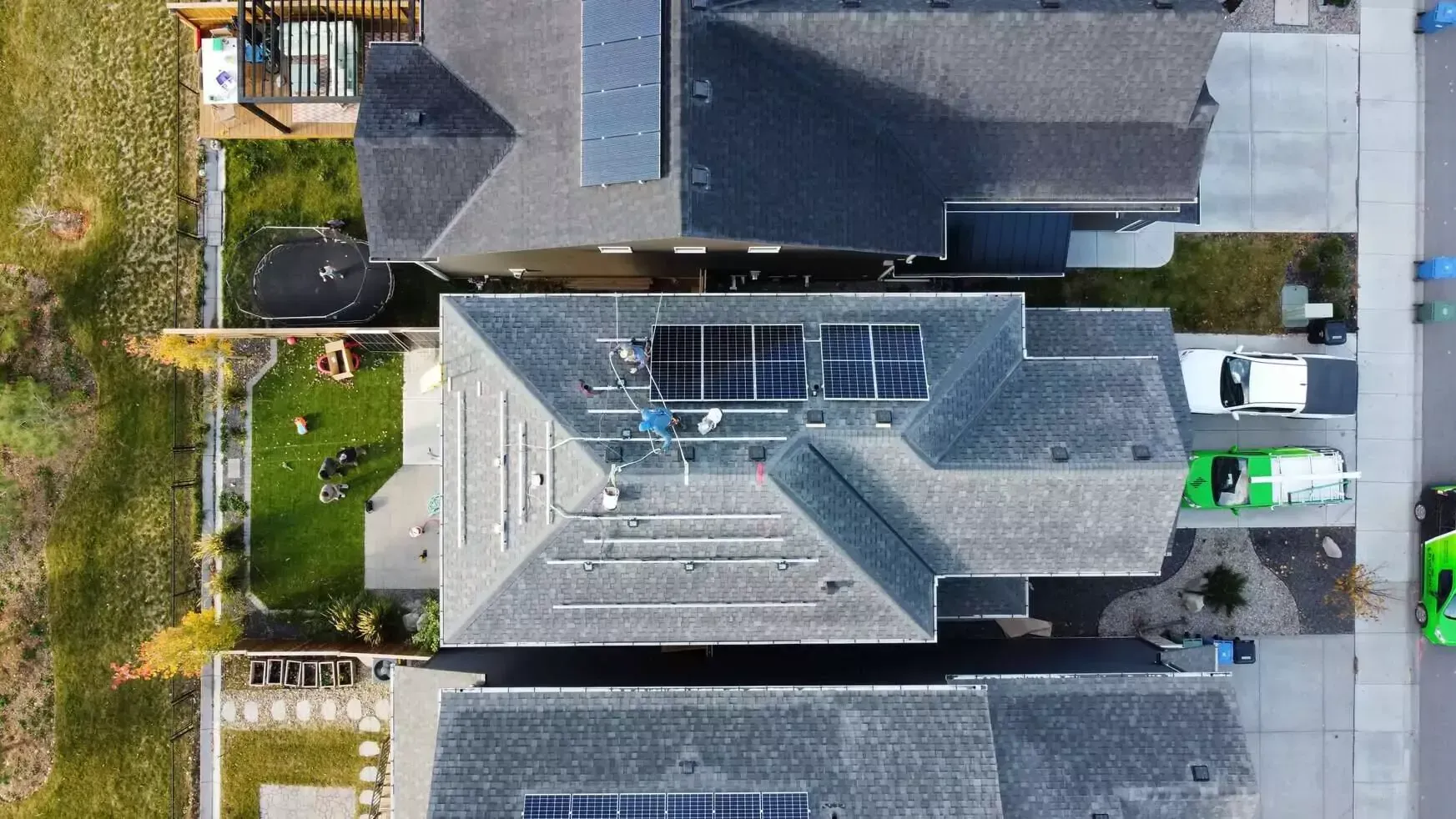
Evalence electricians installing solar on a roof in Calgary, Alberta.
The installation process involves mounting the panels, connecting them to the electrical system, and ensuring that everything is properly wired and functioning. This requires skilled labor and specialized knowledge to ensure that the panels are installed correctly and can maximize their energy production. You should ensure your solar installer is listed in the Solar Alberta Directory.
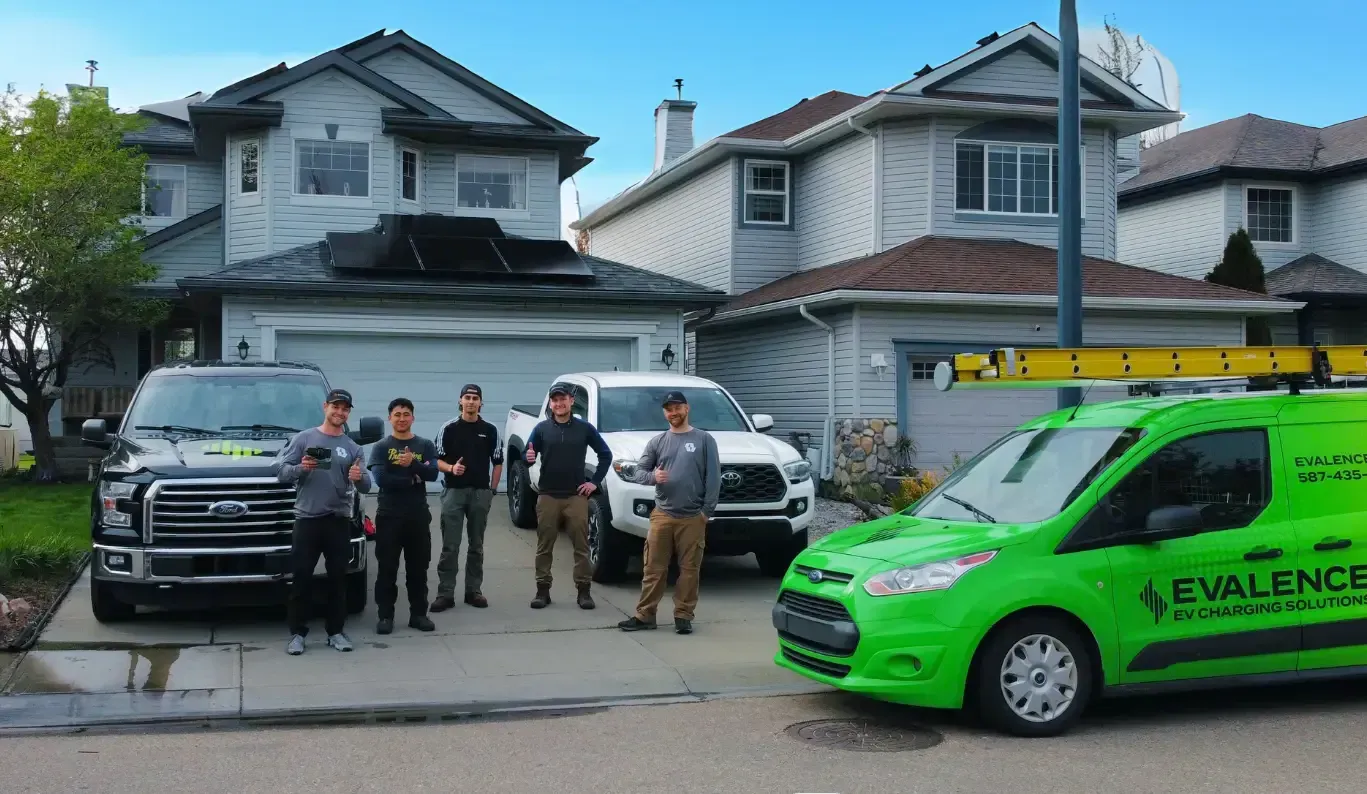
Evalence team members completing a solar installation in Edmonton, Alberta.
Financial Aspects of Solar Panel Investment
Programs like the Greener Homes Grant, Greener Homes Loan, and the Clean Energy Improvement Program (CEIP), can greatly improve the feasibility of installing residential solar systems. Additionally, the selling of carbon credits generated through home solar production can add an additional revenue stream for consideration in the overall project payback period.
Greener Homes Grant
The greener homes grant is a financial grant program for Canadian home owners pursuing energy efficient home upgrades like solar panels. This program can offer up to $5,000 in grant funding per home, which can greatly reduce the cost to install solar panels.
Greener Homes Loan
The greener homes loan is a similar program to the greener homes grant, however it can provide green financing for up to $40,000, for energy efficient upgrades. This loan has a rate of 0% and can be amortized over a 10 year period, making it very attractive for electricity saving upgrades. Often the monthly cost savings from installing solar panels is higher than the cost of repaying the loans. This leaves more money in your pocket, while also increasing the value of your home with solar!
Clean Energy Improvement Program (CEIP)
CEIP is a program administered by Canadian municipalities to provide financing for home energy efficiency upgrades. The program can provide up to $50,000 in financing at rates of between 2.5-4% for eligible home owners. For more information on the application process for CEIP, check out our comprehensive CEIP Guide.
Solar Carbon Credit Markets
Home owners can improve the payback period of their solar pv investment by selling carbon credits generating through clean energy production. In Alberta, Solar Offset and ReWatt Power are organizations which can help you sell your carbon credits with ease. Solar incentives like carbon credit markets are a great way to incentivize renewable projects!
How Do You Apply for Solar Financing in Alberta?
Applying for solar related grants and loans can be completed through the greener homes portal, or through your municipalities CEIP page. If you'd like support with your application, or a quote which can be used for verification purposes please contact Evalence, and we can help!
Are Solar Panels a Worthwhile Investment for Your Home?
A solar panel's value is worth the amount you can save on your electricity bills. Considering the potential reduction in electricity bills and the opportunity to contribute to clean energy, installing solar panels can be a smart investment. Evaluate government incentives, electricity savings, and the potential increase in home value before making a decision. Analyzing your energy usage will help determine if solar power is a worthwhile investment.
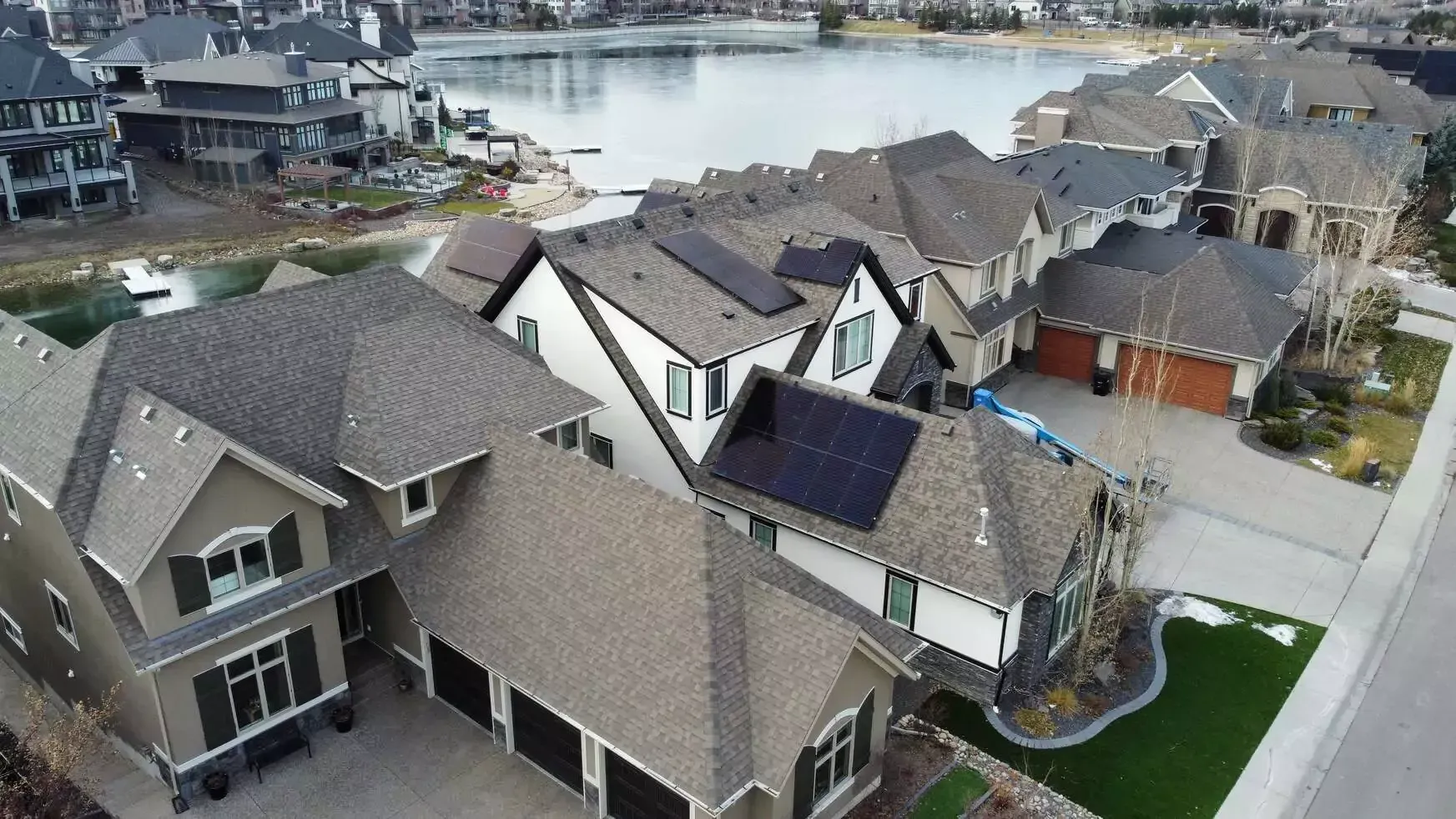
A large solar array installed on a home in Mahogany.
Additionally, getting a solar quote from a high quality installer like Evalence can help you understand the payback of your system with our detailed proposal package with information on your systems payback period, estimated grant funding potential, and solar components. Check out our residential solar page to get started!
Recent Posts
